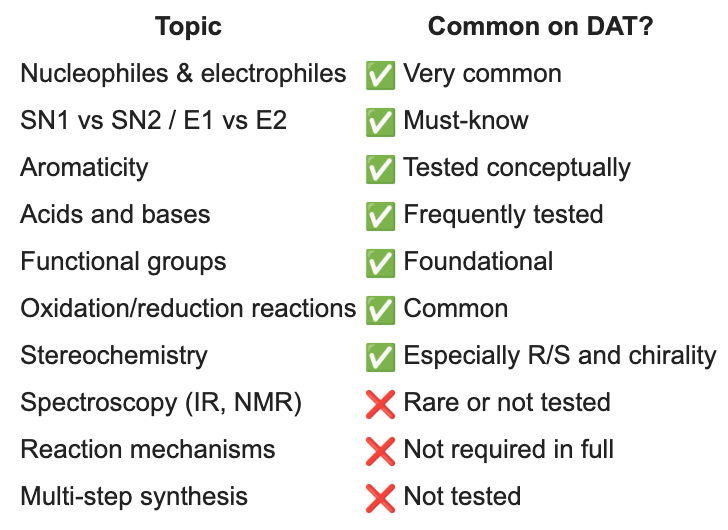How Organic Chemistry on the DAT Compares to Your Undergrad Course
If you’ve taken (or are dreading) Organic Chemistry in college, you're not alone—it’s one of the most notorious weed-out courses for pre-dental students. But when it comes to the DAT Organic Chemistry section, many students wonder:
“Is the DAT version of Organic Chemistry easier than what I did in undergrad?”
Let’s break down how the Organic Chemistry section of the DAT compares to your typical college course—what’s covered, what’s not, and how to prepare smartly.
DAT Organic Chemistry vs. Undergrad: The Key Differences
1. The DAT Focuses on Breadth, Not Depth
In your college class, you probably:
Memorized multi-step mechanisms
Wrote out detailed arrow-pushing
Completed challenging synthesis problems
Had to justify reactivity using theory and resonance
On the DAT, it’s multiple-choice only, and no drawing required.
✅ What the DAT emphasizes:
Reaction recognition
Functional group behavior
Reaction types and products
Stability of intermediates (e.g., carbocations, radicals)
Acid-base properties
Basic lab techniques
❌ What the DAT skips:
Full mechanisms with arrow-pushing
Multi-step synthesis
Advanced spectroscopy or retrosynthesis
🔍 Bottom Line: The DAT covers a wide range of topics but tests them at a more conceptual, high-yield level—no essays, no mechanisms, and no long math-based problems.
DAT Organic Chemistry Topics (What You Really Need to Know)
Here’s a rough breakdown of the most commonly tested topics on the DAT Organic Chemistry section:
Is DAT Organic Chemistry Easier Than Your College Class?
✔️ In Many Ways—Yes
No lab reports
No mechanisms
No partial credit—just pick the best answer
Fewer niche or trick questions than your professor may have thrown at you
✔️ But It’s Still Fast-Paced and Challenging
You’ll face 30 questions in 45 minutes, split between General Chemistry and Organic Chemistry—meaning you have about 22–24 Organic Chem questions and 90 seconds or less per question.
You need:
Fast recall of reactions and rules
Strong conceptual understanding
Strategic guessing skills for unfamiliar material
How to Study for DAT Organic Chemistry (If You’ve Taken It Already)
Even if you did well in class, you’ll need to review and streamline your knowledge. Here’s how:
Use high-yield DAT study platforms (DATBooster, DATBootcamp)
Make a reaction flashcard deck—or use a premade one
Practice DAT-style multiple-choice questions, not textbook problems
Focus on speed + accuracy, not depth
Relearn functional group chemistry and reagent-product relationships
What If You Haven’t Taken Organic Chem Yet?
Some students prep for the DAT before taking Organic Chem II or even Organic Chem I.
Is it doable?
👉 Yes—but you’ll need:
A structured course like DATBooster’s OChem videos or notes
Extra time to learn from scratch
Regular spaced repetition (flashcards, question banks, etc.)
Final Thoughts: College Organic Chem vs. DAT OChem
The DAT Organic Chemistry section is simpler than a typical undergrad course—but that doesn’t mean it’s easy. It’s a high-speed, high-stakes test of your ability to apply foundational OChem concepts quickly and accurately.
✅ Good news: If you’ve survived Organic Chemistry in college, you already have most of the tools—you just need to refocus your study on what’s actually tested on the DAT.
Ready to Dominate DAT Organic Chemistry?
At Dental School Declassified, we help students crush Organic Chemistry with:
One-on-one DAT tutoring from 98th+ percentile scorers
Custom study plans tailored to your OChem background
High-yield resources that cut through the fluff
👉 Book a session today or explore our test-day tips here in the blog!
